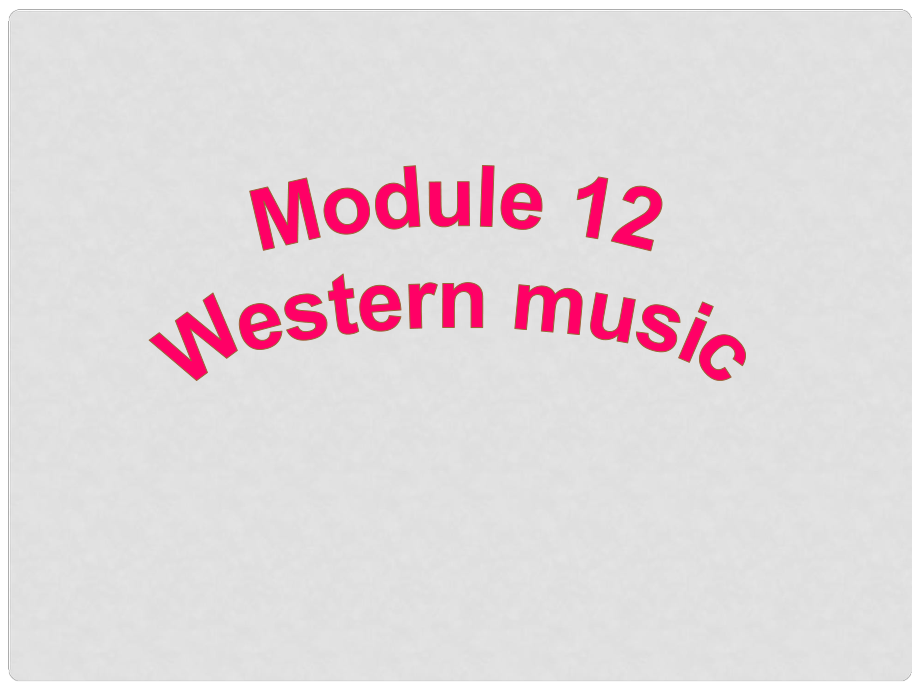《七年級(jí)英語下冊(cè) Module 12 Western music Unit 1 It’s so beautiful!課件 (新版)外研版》由會(huì)員分享�,可在線閱讀,更多相關(guān)《七年級(jí)英語下冊(cè) Module 12 Western music Unit 1 It’s so beautiful!課件 (新版)外研版(36頁珍藏版)》請(qǐng)?jiān)谘b配圖網(wǎng)上搜索�。
1、StraussMozartWestlifeUsherMichael Jackson 維也納是奧地利的維也納是奧地利的首都�,也是世界著首都,也是世界著名的音樂之都�。每名的音樂之都。每年年1月月1日在維也納日在維也納著名的音樂廳著名的音樂廳金色大廳所舉辦的金色大廳所舉辦的“維也納新年音樂維也納新年音樂會(huì)會(huì)”聞名世界�。聞名世界。生詞書簽生詞書簽noisy adj. 吵鬧的吵鬧的sound n. 聲音聲音rock n. 搖滾樂搖滾樂violin n. 小提琴小提琴drum n.鼓鼓voice n.聲音聲音both pron.兩個(gè)�;兩者兩個(gè);兩者opera n.歌劇歌劇LISTEN AND NUMBER
2�、 THE WORDS AS YOU HEAR THEM.( ) lively ( ) modern ( ) music( ) noisy ( ) pop ( ) rock( ) sound ( ) violin ( ) Western123456789Work in pairs. Answer the questions about the conversation in Activity 1.1.Which modern music does Tony like?2. What does Tonys mum think about rock music?3. Why doesnt Tony
3、like traditional Western music?4. Which music does Tonys dad think is too noisy?NOW LISTEN AGAIN AND CHECK.1. Which modern music does Tony like? He likes pop and rock music.2. What does Tonys mum think about rock music? Its lively.3. Why doesnt Tony like traditional Western music? Its too slow.4. Wh
4�、ich music does Tonys dad think is too noisy? He thinks pop music is too noisy.EVERYDAY ENGLISHWhat a beautiful city! Im a fan of rock music. Give us a break! I dont believe it! Now check () the true sentences.( ) 1. Theyre listening to Western music.( ) 2. Tony knows little about Strauss.( ) 3. Stra
5、uss was born in the capital of Australia.( ) 4. The Blue Danube is pop music.( ) 5. Lingling enjoys Beijing opera very much. namemusicTony LinglingBetty DamingtraditionalWestern musicBeijing operapoprockCHECK () THE TYPES OF MUSIC THE STUDENTS LIKE.Complete the sentences with the correct form of the
6�、 words from the box.1. Strauss wasnt _. He came from Austria.2. Daming thinks the _ in rock music are too _. Germandrumsnoisy3. Tony cant _ that Daming doesnt like rock music.4. Betty likes _ traditional Western music and pop music. 5. Tony thinks the sound of the _ in Beijing opera is very differen
7、t. believebothvoiceComplete the sentences about yourself.1. My favourite music is .2. I like it because .3. My parents like .你都做對(duì)了嗎�?你都做對(duì)了嗎�?Listen and read.1. What a beautiful city!2. Its so beautiful!3. I love his music!4. Listen to this!Ask and answer questions about the music you like or dont like
8�、. What music do you like? I like pop. Its lively and good to dance to, but I dont like rock. Its too noisy. What about you? Do you like pop music or rock music? well, I prefer pop music. I think rock music is too noisy. lively adj. 活潑的;輕快的活潑的�;輕快的e.g. She is a lively girl.modern adj. 現(xiàn)代的現(xiàn)代的e.g. Do yo
9、u like modern music or classical music? through prep.穿過穿過e.g. I have to go through that door every day.pop (=popular) adj. 流行的�;流行的; 受歡迎的受歡迎的e.g. Pop music is my favourite music.noisy 是形容詞�,意思是是形容詞,意思是“吵鬧的吵鬧的”�,反義詞是反義詞是 quiet “安靜的安靜的”。即:�。即:noisy quiet 吵鬧的吵鬧的 反義詞反義詞 安靜的安靜的例如:例如:This city is not quiet, i
10�、ts noisy.這座城市不這座城市不安靜安靜,是�,是吵鬧的吵鬧的。sound 和和 voice 辨析辨析 sound 和和 voice 都是名詞�,意為都是名詞,意為“聲聲音音”�。sound 可以指人或動(dòng)物發(fā)出的聲音,可以指人或動(dòng)物發(fā)出的聲音�,或物體碰撞聲??梢哉f,大自然的任何或物體碰撞聲�??梢哉f�,大自然的任何“聲音聲音”都可以用都可以用 sound。而�。而 voice 一般一般指人的聲音,說話�、談笑或唱歌,都可指人的聲音�,說話、談笑或唱歌�,都可用用 voice。例如:例如:At night she heard a strange sound夜里她聽到一種奇怪的夜里她聽到一種奇怪的聲音聲音�。
11、The girl has a sweet voice那女孩那女孩嗓音嗓音很美�。很美。 by 的兩種用法的兩種用法 以前我們學(xué)到的以前我們學(xué)到的 by 的是介詞�,意的是介詞,意為為“乘(車乘(車/船船/飛機(jī))飛機(jī))”�,本模塊學(xué)的,本模塊學(xué)的 by 也是介詞�,意為也是介詞,意為“由由.創(chuàng)作�;被;創(chuàng)作�;被;由由”�,兩者詞性相同但意義不同�。�,兩者詞性相同但意義不同。例如:例如:You can get there by bus你可以你可以乘乘公交車到那兒�。公交車到那兒。 The piece is written by Mozart這是莫扎特的作品�。這是莫扎特的作品。 Give us a break! 意為意為“讓我們清靜會(huì)吧�!讓我們清靜會(huì)吧!”�,是英語,是英語口口語中的一種習(xí)慣表達(dá)方式�,用來阻止語中的一種習(xí)慣表達(dá)方式,用來阻止別人做令人厭煩的事情�。別人做令人厭煩的事情。你都弄懂了嗎�?你都弄懂了嗎�? Review and recite the important points of Unit 1. 復(fù)習(xí)并記憶復(fù)習(xí)并記憶Unit 1 重點(diǎn)內(nèi)容。重點(diǎn)內(nèi)容�。
 七年級(jí)英語下冊(cè) Module 12 Western music Unit 1 It’s so beautiful!課件 (新版)外研版
七年級(jí)英語下冊(cè) Module 12 Western music Unit 1 It’s so beautiful!課件 (新版)外研版

